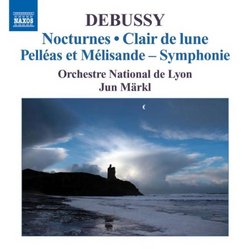| All Artists: Debussy, Jun Markl, Orchestre National de Lyon, Leipzig MDR Radio Choir Title: Debussy: Nocturnes; Clair de lune; Pelleas et Melisande - Symphonie Members Wishing: 0 Total Copies: 0 Label: Naxos Original Release Date: 1/1/2008 Re-Release Date: 1/27/2009 Genre: Classical Style: Symphonies Number of Discs: 1 SwapaCD Credits: 1 UPC: 747313099375 |
Search - Debussy, Jun Markl, Orchestre National de Lyon :: Debussy: Nocturnes; Clair de lune; Pelleas et Melisande - Symphonie
 | Debussy, Jun Markl, Orchestre National de Lyon Debussy: Nocturnes; Clair de lune; Pelleas et Melisande - Symphonie Genre: Classical |
Larger Image |
CD DetailsSimilar CDs |
CD ReviewsDebussy (V. 2): Nocturnes + Orch Music: ONL, Jun Markl: Crys Dan Fee | Berkeley, CA USA | 02/05/2009 (5 out of 5 stars) "This disc is the second of two now published. Is Naxos going to give us a complete set? One hopes. This second volume begins with a synthesis of music from the composer's sole opera, Pelleas et Melisande. Think something like the old Stokowski arrangements of Parsifal or Tristan, though of course this is nearly archetypal French Debussy, not Wagner. Then the second disc continues a famous orchestration of the Clair de lune from the solo piano Suite Bergamasque, followed by the three Nocturnes (Nuages, Fetes, Sirenes). Next to last we get the berceuse heroique. And lastly, this second disc wraps up by offering three newly orchestrated versions of three of the solo piano etudes (Nos. 8.10.12). The orchestrator is Michael Jarrell, a Swiss composer born in 1958. Jarrell has written music in many forms, won notable music prizes for his compositions, and teaches or has taught in Vienna and Geneva. So far, Jarrell has written one opera, a spoken arts work, Cassandra, that was premiered at the California USA Ojai Festival.
[...] Right from this disc's beginning tracks, we can hear that we are in for some special readings of familiar Debussy. The ONL departments do themselves proud, and sound to be fully engaged with the music, as with their leader Jun Markl. The Pelleas et Melisande synthesis is generous and comprehensive, rather as the previous Stokowski synthesis of Parsifal or Tristan excerpts. Consistent with the interpretive grip in volume one of this emerging Naxos Debussy series, the band and this conductor have a decidedly modern or post-modern take on what makes the composer tick. A subtle inflection, grounded in great, burning clarity of textures seems to inform all the readings on disc two. We can hear plenty of tone color, especially from the woodwinds; but all is etched, fiery, crystalline. This music happens in all its details revealed, as well as in its constantly shifting and developing intuitive forms. For once, vivid colors do not mean any neglect of how phrasing mirrors musical narrative flow, all path-breaking and innovative. Clair de lune is still very attractive, but stuns a listener as more of an abstract, sculpted sound-shape in moving time, than as a picturesque evocation of moonlight as, say, a Late Romantic composer might have been moved by extra-musical inspirations. A polar contrast to this reading would be, for example, the several stereo versions of Debussy published once upon a glorious time by Stokowski leading different orchestras. There clair de lune is a rich bon-bon, sensuous, sweet, and supremely balanced in its velvety, chocolaty goodness. Like Haitink or Dutoit or Jean Martinon in an EMI set, the Nocturnes drift (Nuages), dance festively (Fetes), or sweep over us with mysterious and dangerous enchantments (Sirenes); but impress ears and mind with their structural granite, not just their vivid colors or intuitive musical logic. Markl's genius with the ONL inhabits another realm, still brilliant and sensuous and diaphanous - but altogether cooler, though far, far from cold. I do not want to do without the Stokowski or Dutoit or Haitink or Martinon readings, but I like this reading very much, too. Indeed, these readings are so engaging that one laments the lack of an SACD multichannel disc to further immerse oneself aurally in the bending and swooshing of colors and lights, even cooler, even a tad greater in abstracted essences. On to Debussy's Berceuse heroique, and the three etudes orchestrated by Michael Jarrell. These are lovely episodes to wrap up the second disc, without neglecting the established sonic fact that the opera synthesis and the three Nocturnes are the substance. Given the etched hand that guides these later musics, a listener may be reminded of the Third Vienna School, and especially of Anton Webern. Somehow saying a lot, and saying more than has to be spelled out in more typical western musical manners, repetitive, developmental - alternative to the usual. Markl and ONL again emphasize the contrapuntal, as if Debussy knew and drew upon more from our medieval polyphonist-baroque heritage than most of us modern-eared listeners might realize. Indeed, so far: all the disc's readings open up such musings about forebears and continuities of deeper musical intellect. All the rhythms are subtly sprung, and the overall sense of fire and clarity remains to light our audience paths - even if we are occupying vivid intellectual and imaginary realms which seem to have more to do with the fractal ratios of Nature revealed, or the mysterious observational vagaries of quarks - than with an older, post-Romantic Debussy. Kudos, too, to the ladies of the MDR Leipzig Radio Chorus, who appear in Sirenes, the third of the three Nocturnes. As it happens, Jun Markl is also leader appointed to the MDR Leipzig Radio, so his knowing invitation to the German chorus makes family sense, at least at this point in his career. True to interpretive commitments, the chorus fits right in with the cooler, wiser hands at the helm. The siren songs at work, however, are less those of the fabulous, harpy-like sisters of Greek mythology, than those of the great cosmic unknowns of a far-flung field of far star-systems whose galactic noise we now sweep with great satellites and telescopes, journeying outward in orbits of patient technical questing, or tilted upwards beyond our own particular Sol. Whew. The recorded competition is stiff for all of this disc's choices, except for the Michael Jarrell orchestrations of the piano etudes, and the Marius Constant orchestral synthesis from Pelleas et Melisande. Neither seems to have been recorded previously. As with volume one, other choices easily spring to mind, established, long-compelling, long musically attractive. Remember? Stokowski, Pierre Boulez, Jean Martinon (in a wonderful and warmly read complete set on EMI), Charles Dutoit in Montreal (superbly elegant in very good sound), and Yan Pascal Tortelier (on Chandos, another complete set). How about Carlo Maria Giulini with the London Philharmonia in an EMI Great Recording of the Century? How about Colin Davis with the Boston Symphony? Two early markers include, an import Eloquence label recording with Eduard van Beinum in Amsterdam, and an Ades label recording with Manuel in Parish with the French opera band. Another real treasure is Abbado's stunning readings with the Boston Symphony, way back when that orchestra was trying to lure him in, as possible new music director. The BSO will simply amaze us with its superb abilities, often not completely captured in all of its catalog. You can get that gem from Arkiv Music. (In SACD, further add in, Gary Bertini in Cologne, and Paavo Jarvi in Cincinnati.) Amazon lists well over a hundred recordings of one or more Nocturnes, not all of which may readily be in the commercial catalogs. You could almost shut your eyes and grab a fistful without necessarily getting a really awful performance. Okay. Add this one to the end of the keeper list, ranked higher rather than lower. Sound is very good for regular red book CD stereo. I do not know what the engineering difficulties of the ONL hall in France may be, but if they exist at all, they have been well enough resolved by the recording team. For this disc, sound is not a detriment. The second volume of Naxos' new Debussy series represents not only another stand-out of the existing Naxos catalog, plus a second gold star in the Naxos series; but a stand out among competing Debussy performances. When music gets this good I have trouble hanging on to my reviewer task, to make fine distinctions between the top top and the nearly top top. Just enjoy this Debussy, and check out the first Naxos disc, too." |



